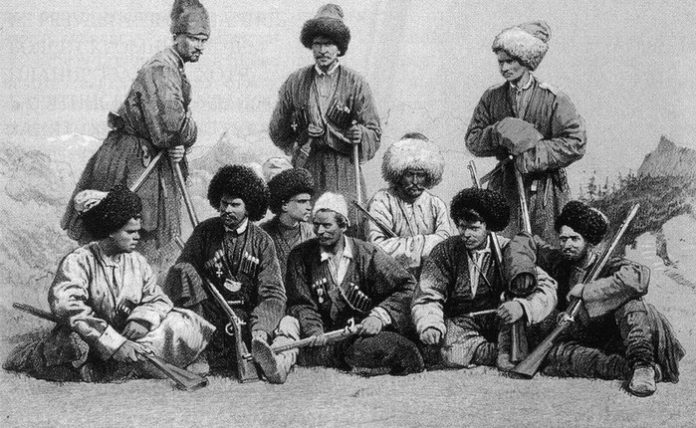
History 15/03/20 As the Cossacks-immigrants fought for the Turks in the Crimean war
Russian Slavophiles welcomed the start of the Eastern war (the Crimean gonna call it later) of Russia with Turkey. They dreamed about what this war will start the “liberation” of the Balkan Slavs under the Ottoman yoke and connecting them “under the scepter of the Russian Orthodox Tsar”. When Russian troops occupied vassal to the Sultan Danubian principalities (now Romania), their command was sent to Bulgaria and Serbia leaflets with appeals to revolt against Turkey. These appeals were not heard. Meanwhile, the Slavic card was played against Russia.
After the suppression by Russia of the Polish uprising of 1830-1831, in Europe settled quite large and politically active Polish Diaspora. The beginning of the Eastern war was seen it also with great enthusiasm. Polish patriots wanted to gain independence, defeating Russia with the help of the armies of the Anglo-Franco-Turkish coalition. In Turkey also there were many Polish immigrants. They settled near Istanbul in the area that today is called in their memory Polonezkoy, where the leader of the Polish Diaspora Adam Czartoryski in 1842 bought land for their agricultural colonies.
One of the immigrants, Michael czajkowski in 1831 came up with a plan to arm Russia Turkish citizens from the former Cossacks. The Russian government even before the war was anxiously watching for his activity and demanded that Turkey issue. To protect yourself from prosecution, Tchaikovsky decided to officially convert to Islam and allegiance to the Sultan. He took the name Sadiq Pasha. Now, with the beginning of the Eastern war, it seemed, it was time to implement his plan.
In the Ottoman Empire lived many of the descendants of the Cossacks abolished by Catherine II in 1775, Zaporizhzhya Sich. In 1778 the Sultan took the Cossacks who emigrated to their citizenship, relegating them for the settlement of the lands South of the Danube. Russia has consistently led the campaign to entice the Cossacks ago. When in 1828 broke another Russo-Turkish war, a detachment of the Danubian Cossacks under command of ataman Osip completely Smooth sided with Russia. This caused reprisals against the remaining Ports of the Cossacks. They settled in various provinces of the Ottoman Empire.
In XVIII-XIX centuries, in different times in Turkey emigrated from the persecution of the tsarist authorities is also a lot of other Russian subjects, mostly old believers and followers of different sectarian teachings: don Cossacks-nekrasovtsy Cossacks, Lipovans, etc. the Ottoman government gave them land for settlement and not let to practice their faith. Now all these Cossacks and other immigrants from Ukraine and Russia, together with the Polish emigrants, under the banner of the struggle with the Russian Empire, who persecuted their ancestors, and tried to gather under the banners of Tchaikovsky.
at the end of 1853, when Russian troops occupied Moldavia and Wallachia, Tchaikovsky scored the volunteer Cossack detachment in the means of the Turkish government and went to fight with him on the Danube. The squad was loudly called “regiment” and then “Slavic Legion”. In fact, it is even the best time for him (in 1854), there were only eight hundred, and they were never full. The basis of this formation was the Cossacks. So the Sultan gave him the historic banner of Zaporozhian Sich, once captured by the Turks. The language of the military commands in “Legion” was Ukrainian.
“Slavic Legion” participated in several skirmishes during the siege by the Russian troops of the Turkish fortress of Silistra (now in Bulgaria, at the border with Romania). Later, he was carrying guard and exploration service in the Turkish army Omer Pasha, who occupied the Danubian principalities after the retreating Russian army. It was in the beginning of 1854. In the landing operation on the coast of the Crimea, “Slavic Legion” was not taken and generally more in the fighting did not participate, carrying garrison and guard service in Dobrogea. The British Commissioner with the Turkish army to Symonds imagined that it was “the best part of the Turkish cavalry”, but her real fighting qualities remained unknown.
Michael czajkowski during the Crimean war, toyed with the plans of the organization in Europe of the Polish army, which was to invade Russia from the territory of the Austrian Empire (when the last will enter the war) or at least to cross under the walls of Sevastopol to the allies, who besieged the city. But the formation of the Polish army depended on the subsidies of the French and British governments, and those not in a hurry to fork out. Expressing in words full support to the liberation impulse of the poles, the official London and Paris knew that their open support of separatism in Russia will make it harder for them subsequently to the conclusion of peace with St. Petersburg. In addition, discord among the leaders of the Polish emigration also harmed her case. So, for many Tchaikovsky, who became Sadyk Pasha, was himself a traitor to Catholicism, and therefore Poland.
the Idea to create a Polish army failed. “Slavic Legion” remains a drop in the sea of allied forces and had no moral influence on Ukrainians and poles living under the Russian government. It was the mirror image of the passive Bulgarians and Serbs on the Danube by Russian troops. Thus, despite all efforts, none of the parties in the Crimean war failed to play to their advantage “Slavic card”.
Yaroslav Butakov
Source:
© Russian Seven
Featured articles Share: Comments Comments on the article “How the Cossacks-immigrants fought for the Turks in the Crimean war” Please log in to leave a comment! br>
Share on Tumblr
















